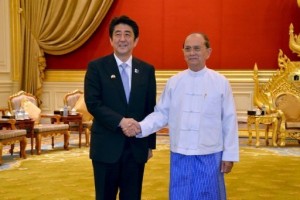Japanese Prime Minister Shinzo Abe should make improving human rights in Burma a key priority during his visit to the country , the New York based Human Rights Watch said in a statement released to coincide with Mr Abe’s visit.
 Mr Abe’s three-day visit to Burma, started on May 24th and will be the first by a Japanese leader in 36 years. The Japanese delegation includes dozens of representatives from Japan’s corporate sector.
Mr Abe’s three-day visit to Burma, started on May 24th and will be the first by a Japanese leader in 36 years. The Japanese delegation includes dozens of representatives from Japan’s corporate sector.
HRW has stressed that Mr Abe’s visit is an opportunity for Japan to press the government to improve human rights in Burma. HRW said despite recent changes in the country many pledges made by Burma’s government are still to be implemented.
Mr Abe in Burma to sign agreements to provide grant money for human resources development and to extend the first Japanese government loan to the impoverished, but resource-rich country since it canceled $3.58 billion in debt earlier this year.
Japan, the largest aid donor to Burma, has considerable and growing business interests in the country. At least 35 Japanese investment projects are underway in Burma, including plans for a massive 5,900 acre Special Economic Zone (SEZ) near the city of Yangon, as reported in regional media.
“As Burma’s biggest aid donor and a major investor, Japan can play a critical role by pressing harder for human rights reforms and protections,” said Brad Adams, Asia director at Human Rights Watch. “Aid and investment in Burma should not ignore needed reforms in the rule of law, transparency, and accountability.”
Mr Abe is expected to announce a 50% increase in Overseas Development Assistance (ODA) during his visit, and under the 1991 “Four Principles of ODA” and the ODA Charter of 1992, Japan has pledged to pay full attention to democracy, basic human rights, and freedoms in its aid decisions, HRW said.
The Japanese government should also mandate public reporting on investment in Burma, in line with United States requirements that were finalized on May 23, HRW added.
“Development projects in Burma have frequently been synonymous with abuses such as forced labor, land evictions, and denial of basic rights, and Japan should use its leverage to ensure these abuses end.” Adams said.
For instance, international telecommunications companies risk being linked to human rights abuses if they enter the Burmese market before adequate protections are in place. The Burmese government has not yet created a legal framework for the telecommunications sector that respects basic human rights, including the rights to freedom of expression and privacy.
“Telecom companies that rush into Burma before rights protections are in place risk complicity in illegal surveillance, censorship, and other repression,” said Cynthia Wong, a senior Internet and human rights researcher at Human Rights Watch.


